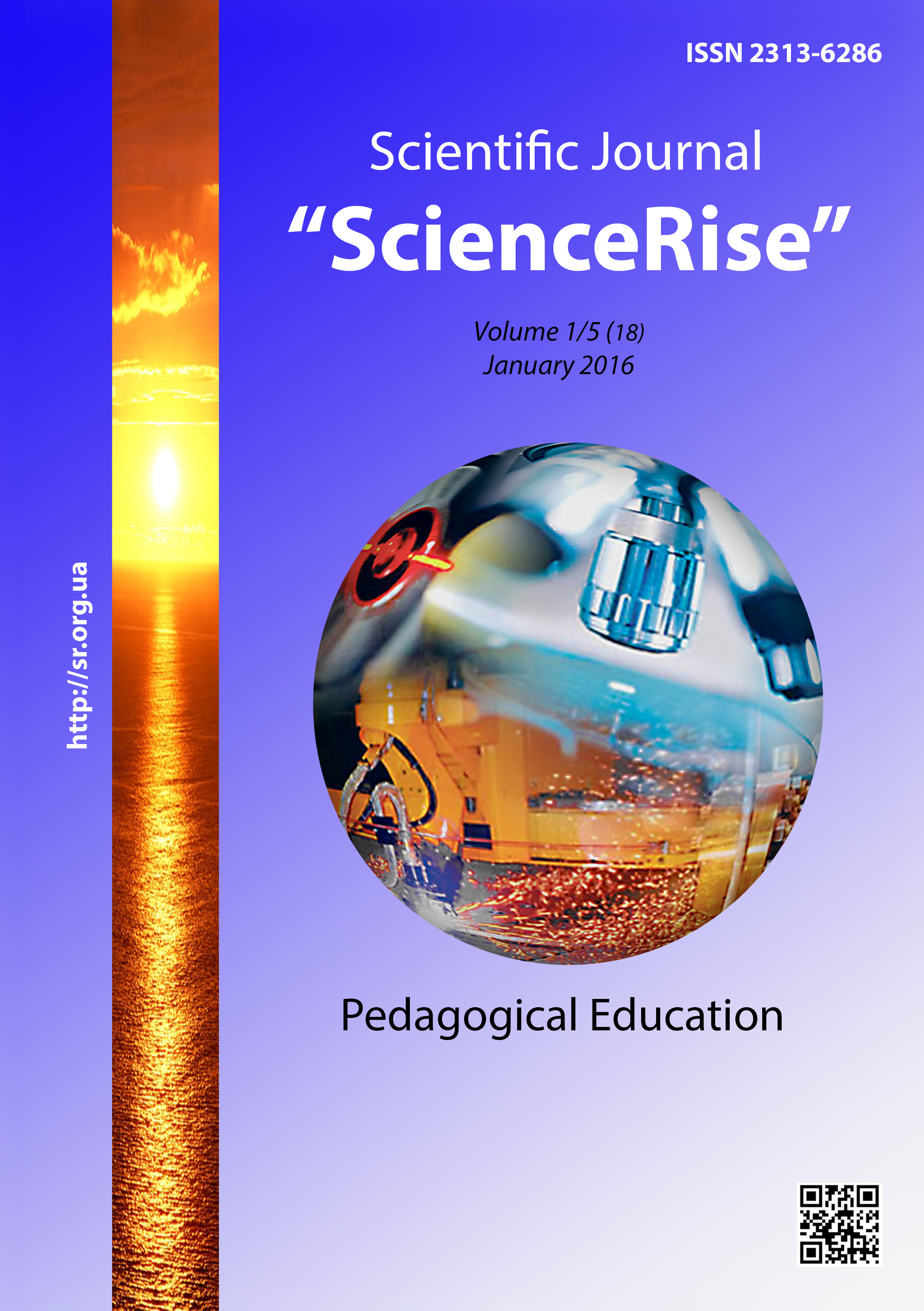Формування професійної компетентності вчителя технологій
DOI :
https://doi.org/10.15587/2313-8416.2016.59151Mots-clés :
вчитель технологій, компетенції, компетентність, професійна компетентність, інформаційно-комунікаційні технології, інформаційно-освітнє середовище, підготовка вчителяRésumé
У статті розглядається проблема формування професійної компетентності майбутнього вчителя технологій у вищому навчальному закладі, що здійснюється на основі використання інформаційно-комунікаційних технологій. Актуальність цієї проблеми визначається суперечностями між соціальною потребою у висококваліфікованих учителях технологій, здатних компетентно здійснювати професійну діяльність, і недостатньою розробленістю методів і прийомів формування в них цієї професійної якості в теорії і практиці вищої освіти
Références
Nychkalo, N. G. (2002). Pedagogical and psychological research in Ukraine: problems and future directions. Modern information technologies and innovative teaching methods in training: methodology, theory, experience, problem. Kyiv, Vinnitsa: Vinnitsa Dov, 16–22.
Berbet, V. V. (2002). Implementation of information technologies in the process of monitoring student achievements at lessons of labor studies. Modern information technologies and innovative teaching methods in training: methodology, theory, experience, problems, 2, 120–123.
Gurevich, R., Boychuk, V. (2015). The current paradigm of technology education in school. Work training in schools, 6, 2–5.
Gershunsky, B. S. (2002). Philosophy of Education for the XXI Century. Moscow: Ped. Prospect of Russia, 512.
Bykov, V. Y. (2009). Organizational models of open education. Kyiv: Atika, 684.
Zhaldak, M. I., Oleinik, A. G., (1989). New information technology: information culture teacher. Sov. school, 1, 71.
Sysoevа, S. (2001). Teaching technology in continuous professional education. Kyiv: VIPOL, 502.
Spector, J., Michael-de la, T., Ileana (2001). ERIC Clearinghouse on Information and Technology Syracuse NY. Competencies for Online Teaching. ERIC Digest. Competence, Competencies and Certification. Available at: http://www.good-practice.de
Zeer, E. F. (1998). Personality-oriented professyonalnoe Education. Ekaterinburg: Izd Urals. state. prof.-ped. University Press, 126.
Bruner, J. (1989). Psychology cognition. Moscow: Progress, 412.
Goncharenko, S. U., Nychkalo, N. G. (2000). Professional education. Kyiv: High School, 380.
Holodnaya, M. A. (1997). Psychology intelligence: paradoksi Studies. Tomsk: Publishig House of Tomsk University Press, 397.
Zyazyun, I. A. (2005). Philosophy progress and prognosis of the educational system. Pedagogical skills: problems, searches, perspectives. Kyiv: Deaf: RIO HDPU, 10–18.
Pometun, A. I. (2004). Competency approach to the evaluation of student achievement. Kyiv: Presentation at the meeting of the Center for Testing Technologies, 10.
Mоrska, L. I. (2007). Methodical system of training future teachers of foreign languages to use information technology in teaching students. Ternopol: TNPU of V. Hnatiuk, 243.
Boychuk, V. M. (2012). The use of information technology in art and graphic preparation of students. Actual problems of modern science and research. Vinnitsa: LLC "Firm Glider", 47–50.
Téléchargements
Publié-e
Numéro
Rubrique
Licence
(c) Tous droits réservés Віталій Миколайович Бойчук 2016

Cette œuvre est sous licence Creative Commons Attribution 4.0 International.
Our journal abides by the Creative Commons CC BY copyright rights and permissions for open access journals.
Authors, who are published in this journal, agree to the following conditions:
1. The authors reserve the right to authorship of the work and pass the first publication right of this work to the journal under the terms of a Creative Commons CC BY, which allows others to freely distribute the published research with the obligatory reference to the authors of the original work and the first publication of the work in this journal.
2. The authors have the right to conclude separate supplement agreements that relate to non-exclusive work distribution in the form in which it has been published by the journal (for example, to upload the work to the online storage of the journal or publish it as part of a monograph), provided that the reference to the first publication of the work in this journal is included.

